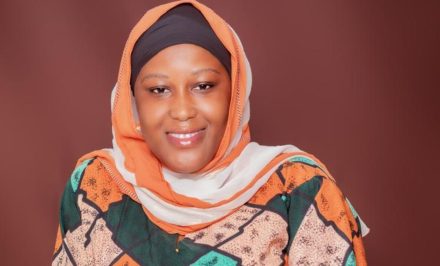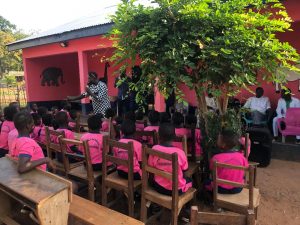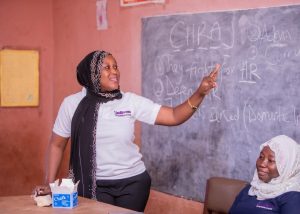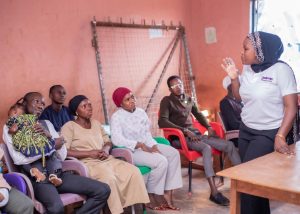 Cameroon : Dr. Yasmine Ndassa, the research scientist turned data storyteller
Cameroon : Dr. Yasmine Ndassa, the research scientist turned data storyteller
 Julien Ngum Che : advocating for the rights of displaced women and youth in Cameroon
Julien Ngum Che : advocating for the rights of displaced women and youth in Cameroon
 Chilufya Mutale Mwila, the Zambian entrepreneur driving financial inclusion across Africa
Chilufya Mutale Mwila, the Zambian entrepreneur driving financial inclusion across Africa
 Wangari Muchiri, the Kenyan engineer committed to accelerating the ecological transition in Africa
Wangari Muchiri, the Kenyan engineer committed to accelerating the ecological transition in Africa


In her hometown of Tamale, in the northern region of Ghana, Sherifa Napari Iddrisu cofounded Hadaj Academy in 2015, an inclusive and transformative institution promoting the education of children with special needs. Driven by her passion for human rights, she also joined the Commission on Human Rights and Administrative Justice (CHRAJ) in Ghana in 2022, where she is currently working as an investigator.
Whether as a school leader or an investigator at CHRAJ, it’s no surprise that Sherifa Napari Iddrisu is nicknamed “Mrs. Human Rights” in her community. In 2015, after earning her bachelor’s degree in Economics and Linguistics, she co-founded Hadaj Academy with her mother, a retired teacher. Initially established as a mainstream school, the institution evolved in 2017 into an inclusive and transformative educational center dedicated to promoting education for children with special needs.

Today, Hadaj Academy stands as one of the leading schools in Tamale, providing educational opportunities and support for students with learning disabilities or special needs. Starting with just two students, the academy has grown to welcome over a hundred learners, including both typical students and those with special needs, all in an inclusive environment, Sherifa shares enthusiastically.
The school’s journey into inclusive education began when it enrolled for the first time a student with autism, she recalls. “The mother came to us, literally weeping. She had tried everything in vain. She brought her child to us, and we admitted him to the school. However, parents soon started hearing about this student through their children and began threatening to withdraw their kids if we did not remove him. We tried reasoning with them, but some still chose to withdraw their children. Despite this, we decided to stand by this child, and that decision ultimately led to more students with special needs joining our school,” she explains to Africa Women Experts.
Then came the decision to position the school as an inclusive educational center. “It wasn’t an easy decision,” she confides, as the school had to invest in training teachers with the help of experts to accommodate these students and acquire the necessary equipment.
Today, in an environment where most private and mainstream schools are not suitable for students with special needs, her institution stands out by welcoming students with diverse needs, ranging from hearing impairments to physical disabilities. As part of its pedagogy, the school provides differentiated instructions to accommodate all students, including typical learners and those who are slow or low learners. “We have a special curriculum for these students that allows them to progress at their own pace, while ensuring they don’t fall behind. By the end of the term, they should all be able to catch up with their peers in terms of exercises, exams, and everything else. In the end, they all adapt, and no one is left behind,” she confides.
Moreover, although the school is neither a foundation nor a charity, it offers low-cost tuition, thanks to the generosity of some parents and the support of various organizations. This makes it accessible to low- and middle-income families, encouraging them to educate their children.
From Hadaj Academy to CHRAJ : a journey into Human Rights


Driven by her commitment to promoting inclusive education, Sharifa decided to dedicate herself fully to human rights in order to have a greater impact. Along with her work at Hadaj Academy, she joined the Commission on Human Rights and Justice (CHRAJ) in 2022, a government institution, where, as an investigator, she works on issues related to human rights, administrative justice/injustice, and corruption. “Investigating is not an easy task. Investigators bear the greatest share of responsibility because their actions can either build or destroy an institution or an individual,” she explains.
As part of her role as an investigator, she has been assigned multiple cases involving gender-based violence, particularly early marriages of young girls, a widespread issue in her community. Another alarming problem is the false accusation of elderly women as witches. Some are lynched to death, while others are expelled from their communities and left to fend for themselves, she confides. “In all these situations, our investigations always lead us back to extreme poverty and ignorance,” she says.
To address these issues, the commission focuses on preventive measures, by educating people about how their actions, often rooted in their customs, can violate human rights. It also promotes positive masculinity by working with men—who are often the perpetrators of violence—to help them become allies and embrace new ways of communicating, rather than resorting to violence.
While her work in this area has had a significant impact, transforming many women’s lives, it has also come with challenges, including security threats against her. « Just the fact that I’m impacting and changing people’s lives means not everyone is happy about it. There are times when I receive threatening calls because I prevented people from marrying off their daughters. I’ve also helped some women stand up to their aggressive husbands. Some have even gone as far as leaving their abusive relationships, and their men are not happy about it. I’m told that I’m the reason these women left their husbands. But at the end of the day, it’s worth it », she explains.
Another challenge she faces while doing her work is the stereotypes against women. «We still have a long way to go when it comes to female leadership. Women leaders are often automatically seen as troublemakers or stubborn people. At this point, I’m just focused on moving forward. I don’t care what people think or say, as long as the objective I’m working toward is achieved », she says.
The birth of SheBlooms Foundation
With a strong background in inclusive education and human rights, Sherifa is committed to amplifying the voices of the most vulnerable in her community. Recognizing the need for a platform where marginalized individuals can seek redress for the injustices they experience, she launched in 2024 “SheBlooms“. It is a foundation committed to fostering a society where women can live free from oppression and claim their fundamental rights without fear. Through this initiative, she advocates for women’s land and property rights, supports survivors of abuse in their pursuit of justice for abuse without fear of judgment or societal backlash, and ensures access to comprehensive sexual and reproductive health services—particularly for vulnerable girls and women.
As she forges ahead, Sherifa remains committed to her mission: to build a world where every human is empowered to speak up, thrive, and reclaim his/her rightful place in society.
Sherifa Napari Iddrisu holds a Bachelor of Arts in Economics and Linguistics, as well as a Master of Arts in Educational Leadership and Management from the University of Ghana. She is currently a final year student pursuing an International Action Learning MBA (Sexual and Reproductive Health major) at Business School Netherlands.
Danielle France Engolo